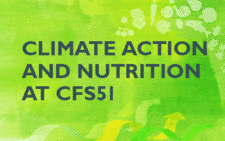Highlights
Resources
No matter how it is defined, nutrition starts with what we eat, the products of the food and agriculture sector. By working on our food systems, on the way we produce, collect, store, transport, transform and distribute foods, we can improve our diets, our health and our impact on natural resources. In lack or in excess, problems of nutrition always encompass inappropriate choices and practices. Nutrition education is an important step in empowering the consumer to make healthy food choices.
FAO's role in nutrition
Good nutrition is our first defense against disease and our source of energy to live and be active. Nutritional problems caused by an inadequate diet can be of many sorts, and when they affect a generation of youngsters, they can lower their well-being and learning capacities, thus compromising their futures. In some cases, perpetuating an inter-generational cycle of malnutrition, with severe consequences on both individuals and nations.
While young children and women are the most vulnerable to malnutrition, the right to adequate food is universal and good nutrition is essential for all. Problems of malnutrition –undernutrition, micronutrient deficiencies and obesity – exist in all countries and cut across socio-economic classes.
Emerging challenges, such as climate change, environmental sustainability and rapid technological shifts, are transforming food systems and raising questions about how to ensure healthy diets for a growing world population in sustainable ways.
At the same time, uneven economic growth, social and economic transformations and other factors are shaping food systems and diets. As a result, the prevalence of overweight, obesity and related non-communicable diseases are increasing while undernutrition and micronutrient deficiencies persist.
The Vision and Strategy for FAO’s Work in Nutrition (FAO Nutrition Strategy) is part of the Organization’s strategic framework, and aims at achieving the corporate goal of reducing malnutrition through efficient, inclusive, resilient and sustainable agrifood systems . The Nutrition Strategy seeks to tackle malnutrition in all its forms by accelerating policies and actions across agriculture and food systems to enable healthy diets for everyone. Through this mission, FAO will contribute to the achievement of the 2030 Agenda for Sustainable Development, leaving no one behind. The FAO Nutrition Strategy seeks to improve diets and raise levels of nutrition through a people-centered approach leveraging all FAO expertise in different areas of the food system, through the following actions:
- Support and facilitate action in the follow-up to the 2014 Second International Conference on Nutrition (ICN2); co-convene the UN Decade of Action on Nutrition and lead the implementation of its work programme jointly with the World Health Organization (WHO), in collaboration with key partners.
- Support the uptake of the Committee on World Food Security (CFS) Voluntary Guidelines on Food Systems and Nutrition.
- Research on and release evidence, data and guidelines on food-based approaches to improve nutrition including food composition, nutrition and diet assessment and food consumption indicators, and Food-based Dietary Guidelines.
- Contribute to international standards and guidelines, through the provision of scientific advice to the Codex Alimentarius in relation to human nutrition requirements, in collaboration with WHO.
- Strengthen countries’ capacities to evaluate and monitor the nutrition situation, analyze options, and implement agricultural and food systems’ policies and programmes that impact positively on nutrition.
- Provide tools, guidance and support for the scaling up of efficient nutrition education and consumer awareness at national and local levels, including through schools and agricultural extension services.
- Develop and provide policy and programme decision makers with tools to assess and improve market and value-chain approaches for better nutrition, with local-specific approaches targeting territorial markets and Geographical Indication food products.
- Provide data, evidence and guidance to reduce food loss and food waste in agrifood systems, in view of making them more efficient in providing the healthy diets needed for a growing global population.
- Coalition of Action on Healthy Diets from Sustainable Food Systems for Children and All (HDSFS Coalition)
- FAO Policy Support and Governance Gateway: Nutrition and Food Systems
- FAO/WHO GIFT: Global Individual Food consumption data Tool
- Food-based dietary guidelines (FBDGs)
- Food Labelling
- Geographical Indications
- Nutrition and Forests
- School food global hub
- Technical Platform on the Measurement and Reduction of Food Loss and Waste
- The Right to Food





